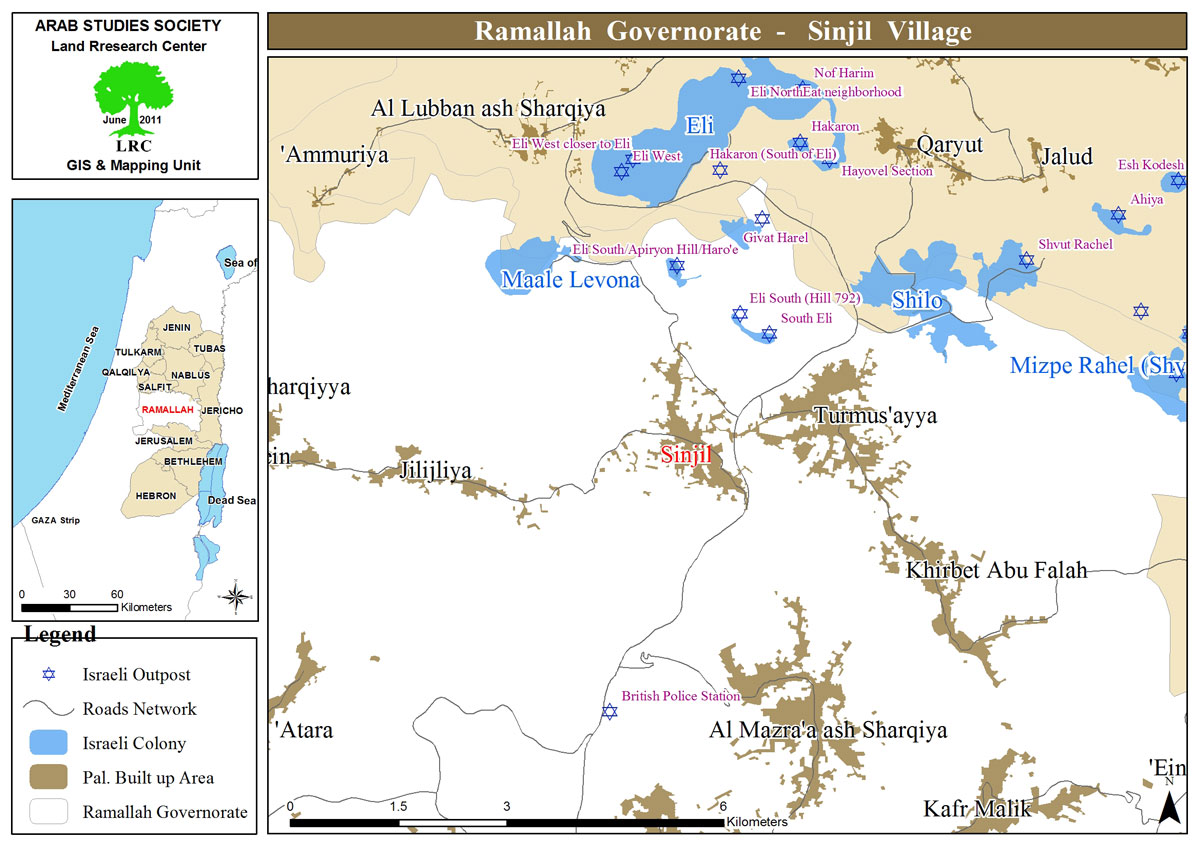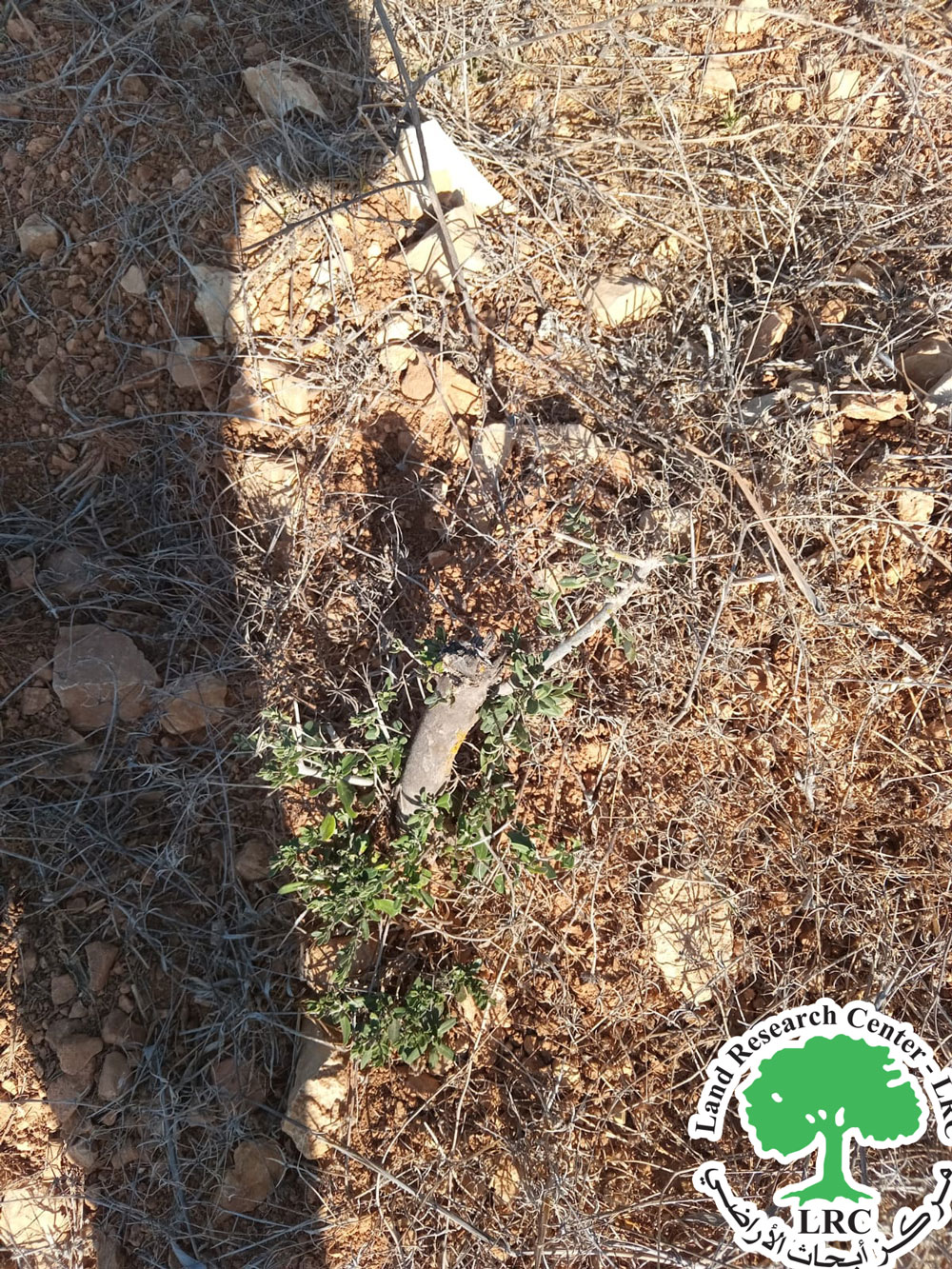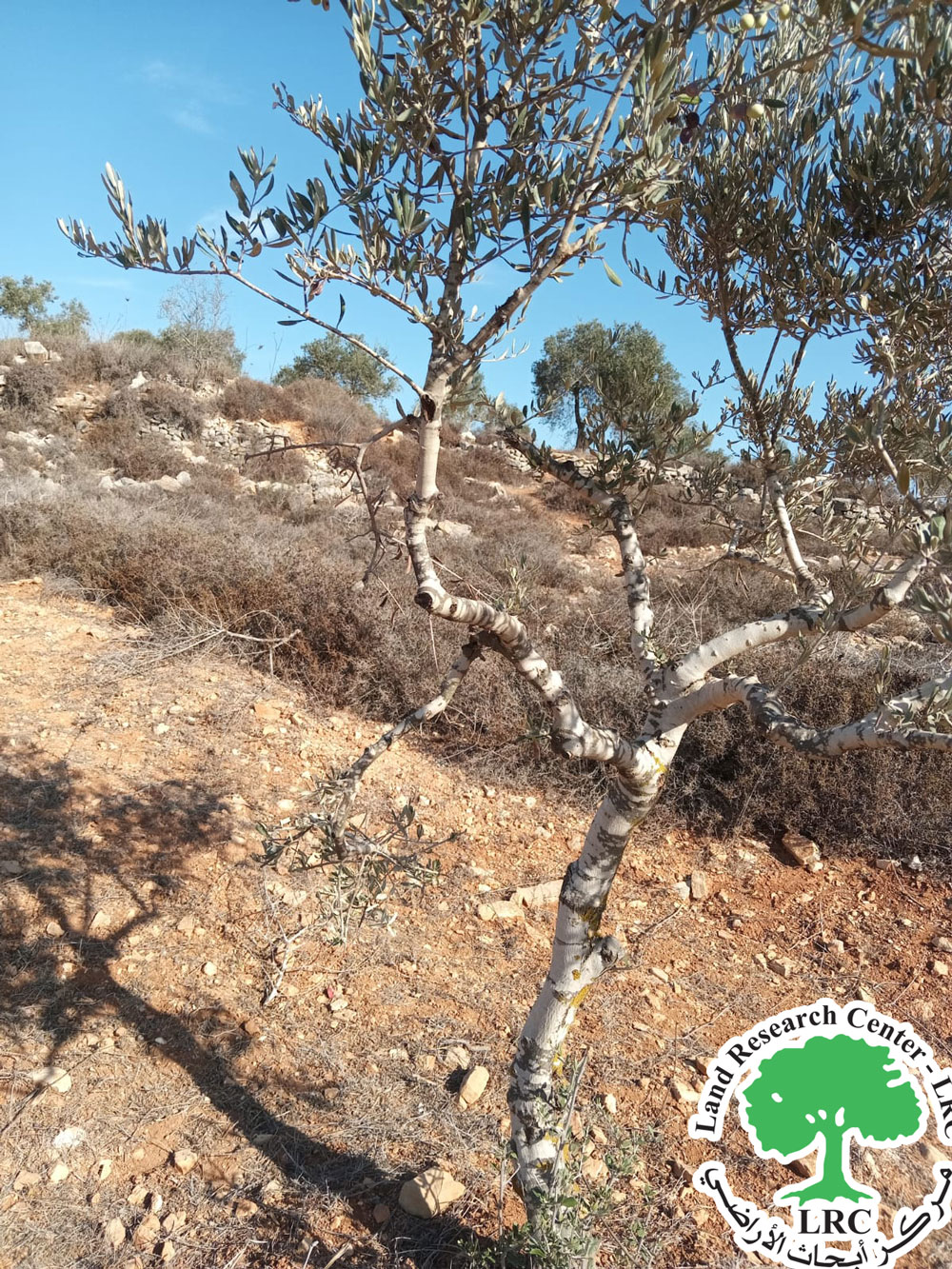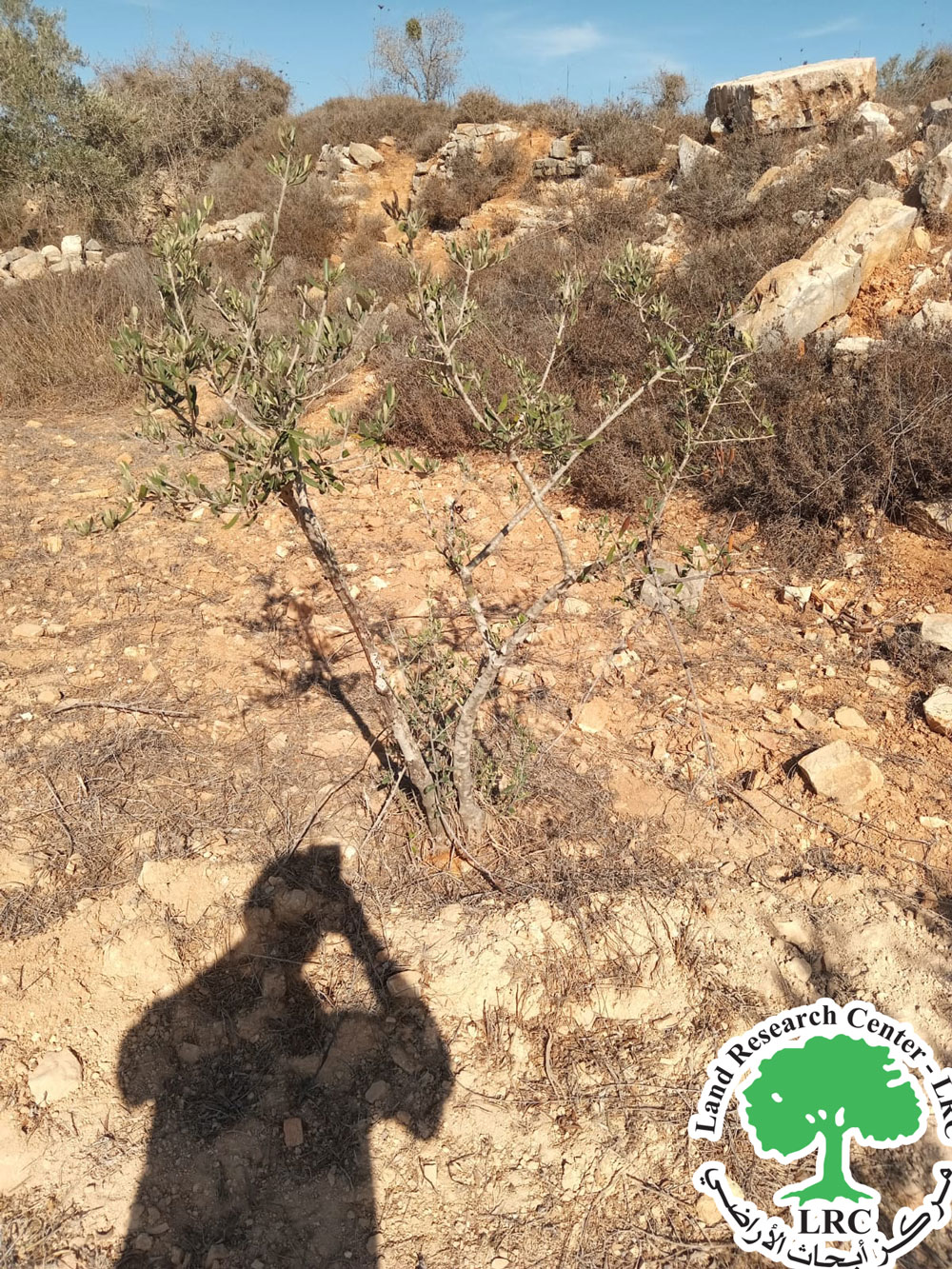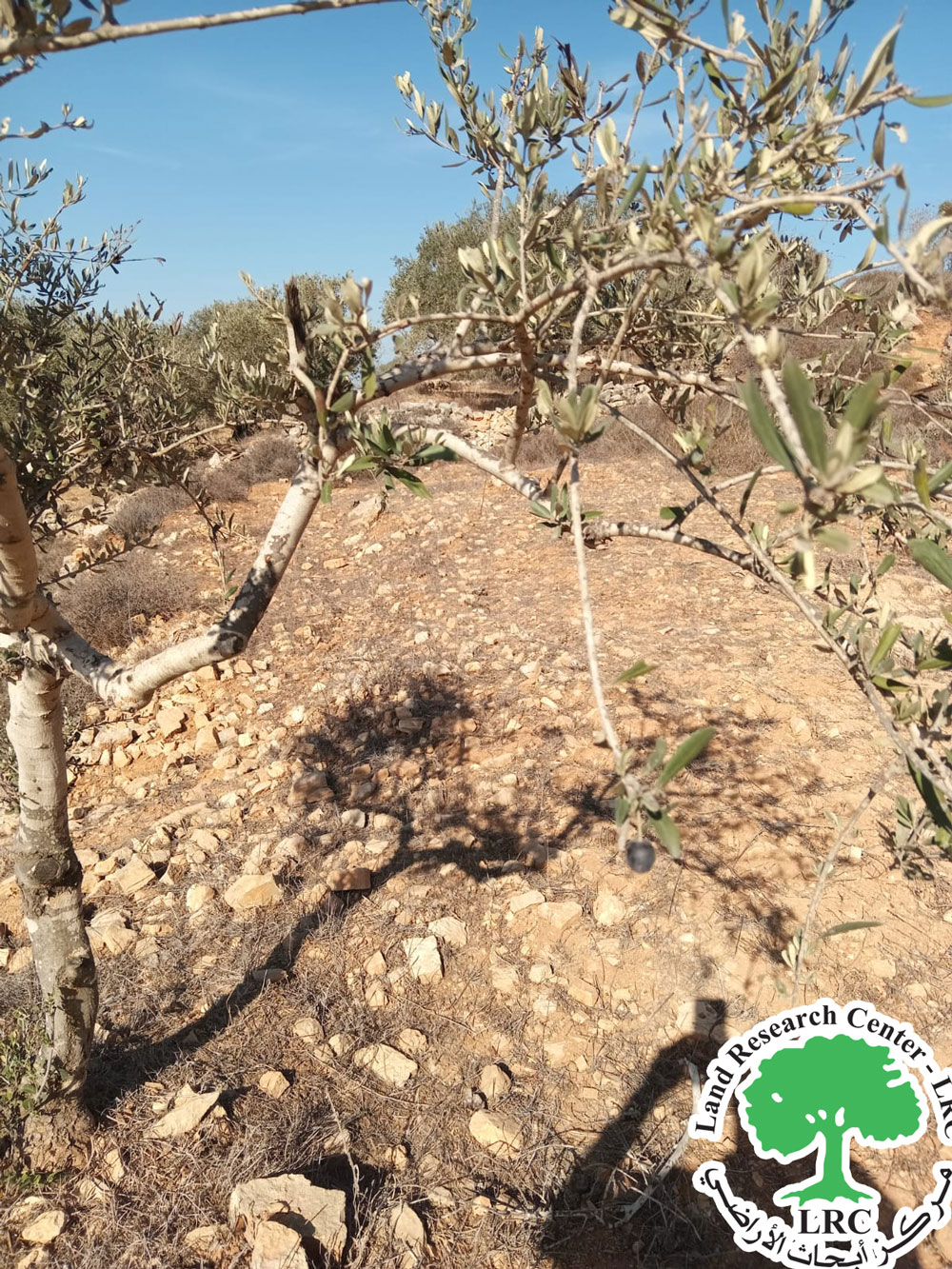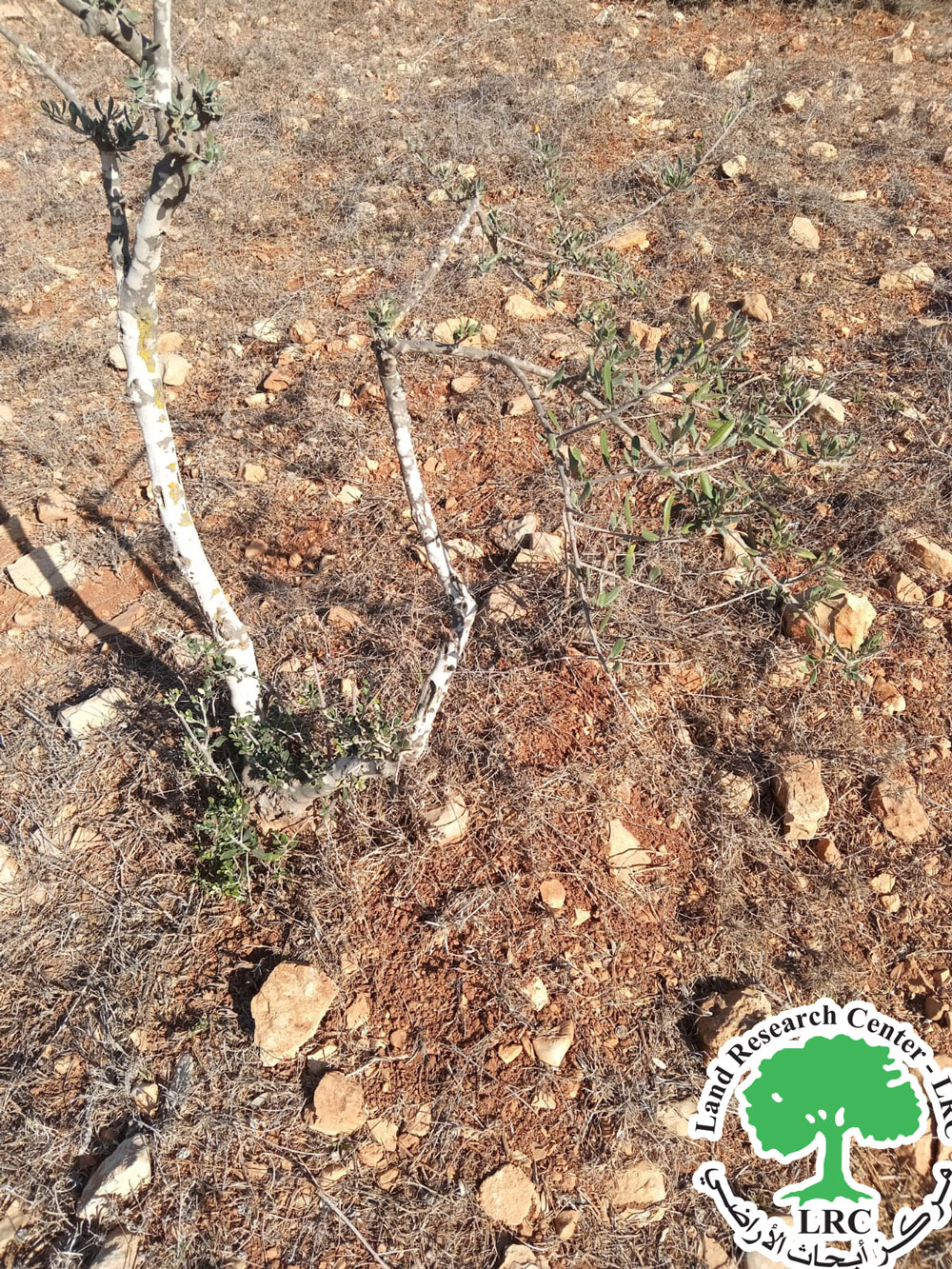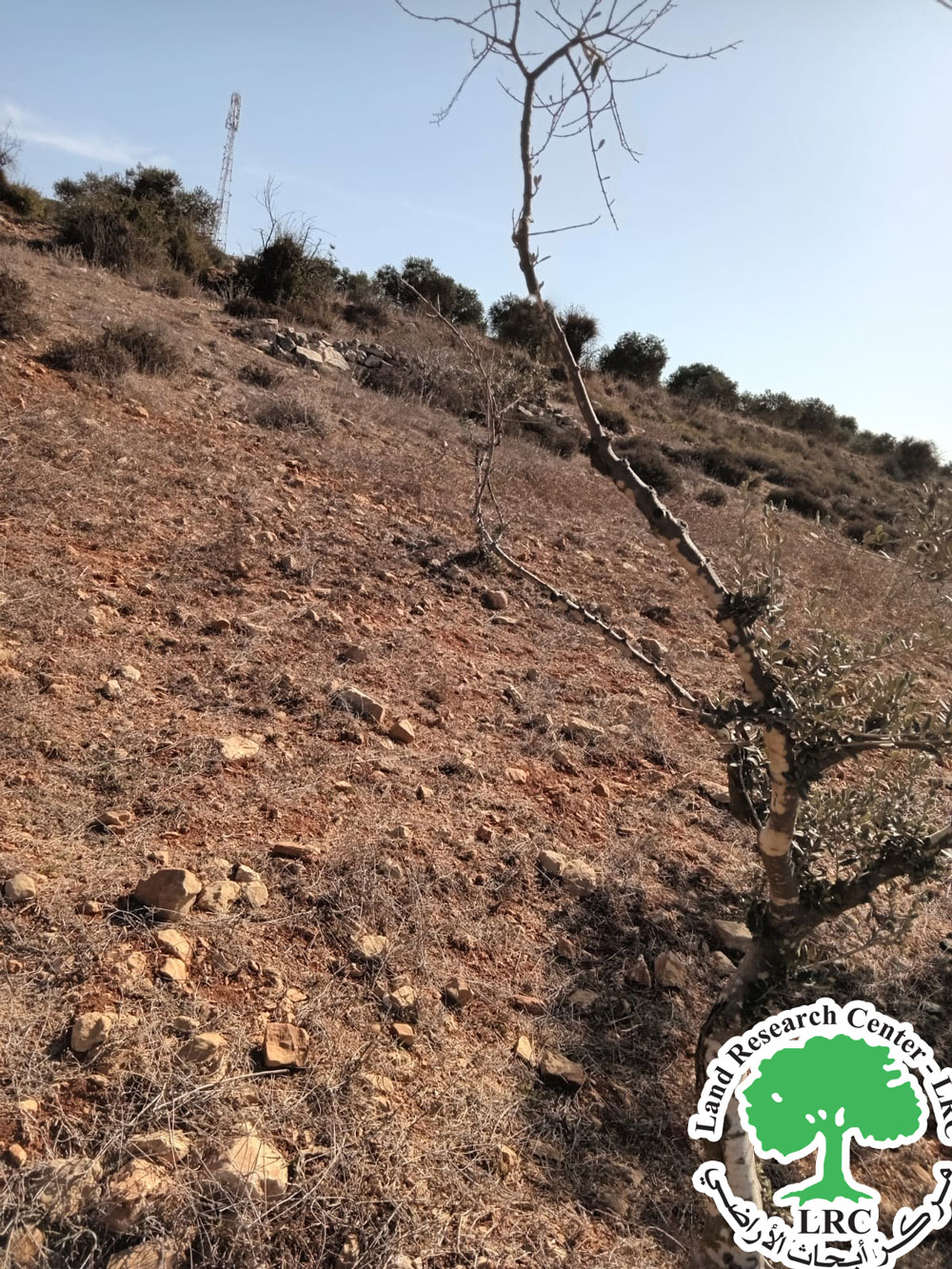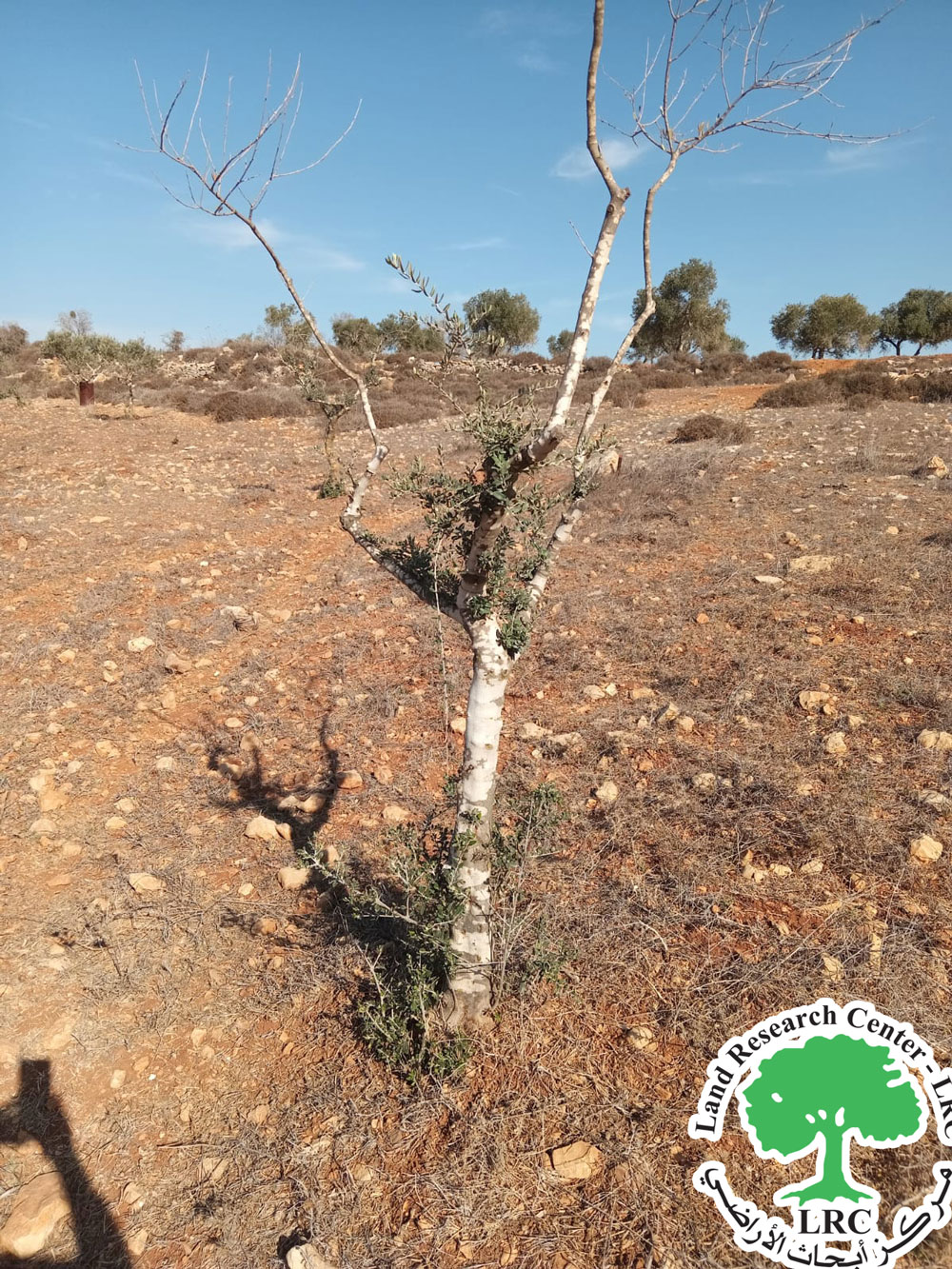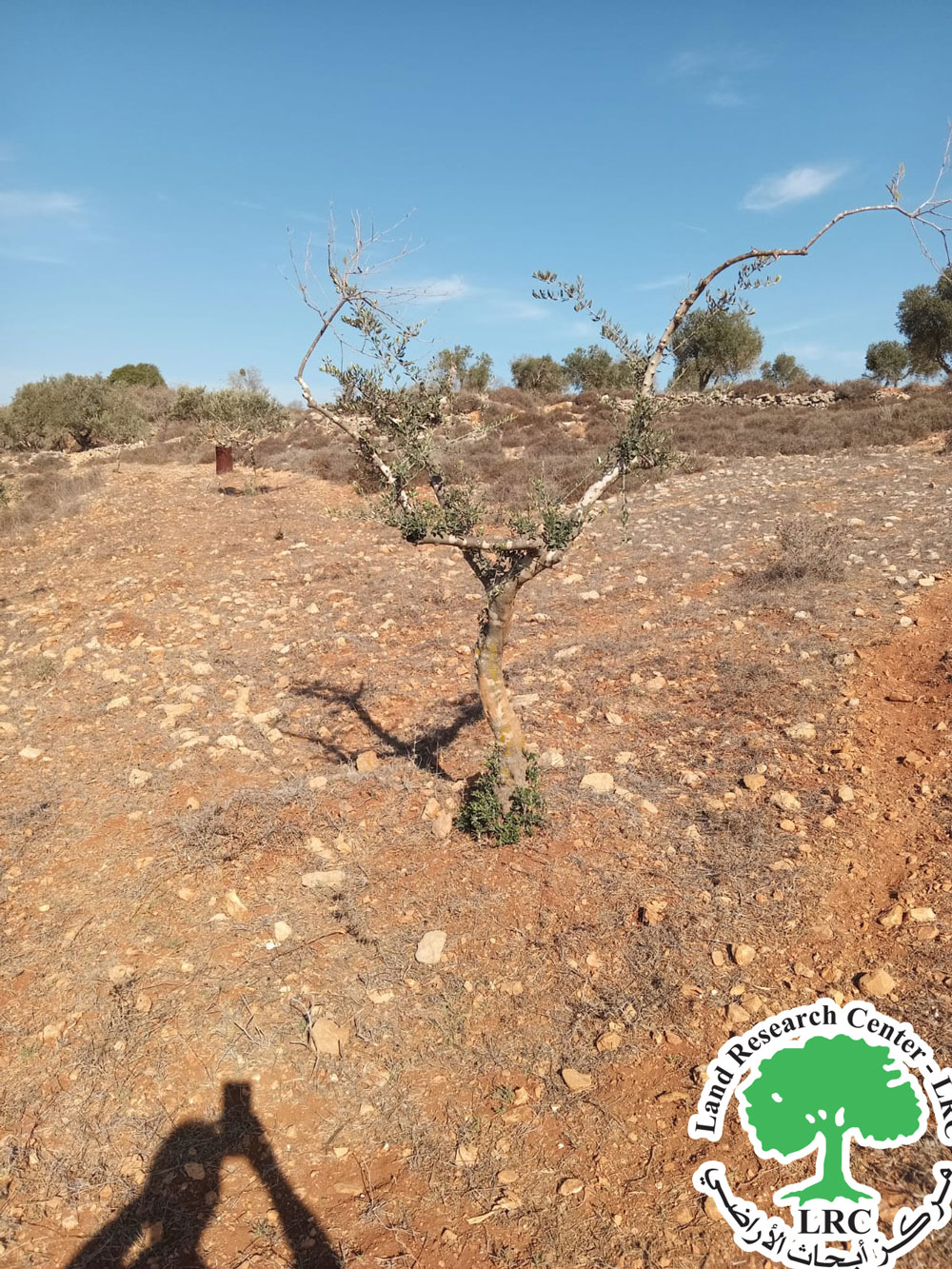في موسم قطاف الزيتون ... المستعمرون يستهدفون زيتون بلدة سنجل / محافظة رام الله
- الانتهاك: قص وتخريب 50 غرسة وشجرة زيتون.
- الموقع: بلدة سنجل شمال مدينة رام الله.
- تاريخ الانتهاك: 22/10/2024.
- الجهة المعتدية: مجموعة من المستعمرين.
- الجهة المتضررة:
تفاصيل الانتهاك:
أقدمت مجموعة من المستعمرين على استهداف قطعة أرض زراعية في بلدة سنجل، عبر تخريب الأشجار المزروعة داخلها.
يذكر أن المزارع ناصر عيسى خليل، وأثناء توجهه الى أرضه في منطقة " أبو العوف" شمال بلدة سنجل، في صباح يوم الثلاثاء الموافق (22/10/2024)م، حيث تفاجىء بقيام المستعمرين بقص وتخريب أغصان 30 شجرة زيتون بعمر 25 عاماً، بالإضافة الى اقتلاع 20 شجرة زيتون بعمر خمسة أعوام، وإلحاق أضرار كبيرة بها، ولم يكتف المستعمرين بذلك، بل تعدى الأمر الى سرقة ثمار الزيتون من تلك الأشجار قبل إتلافها.
وقد أفاد المزارع ناصر عيسى بالقول:
" توجهت برفقة عدد من المزارعين باتجاه منطقة " أبو العوف" وهي تقع شمال البلدة وعادة ما نقوم بالتوجه هناك باستمرار، ولكن بعد أحداث السابع من اكتوبر والحرب على غزه، فقد قلت حركتنا هناك بسبب التواجد المستمر للمستعمرين في المنطقة، ومحاولتهم الاعتداء علينا أكثر من مرة، ولكن ما جرى حديثاً هو أننا توجهنا الى الأرض لجني ثمار الزيتون، والصدمة كانت أن المستعمرين قاموا باتلاف 50 شجرة من أرضي البالغ مساحتها دونم واحد، حيث تم قطع 20 شجرة بعمر خمسة أعوام بالكامل، وأيضاً تم اتلاف 30 شجرة بعمر 25 عاماً عبر قص الأغصان، وعلى ما يبدو أن المستعمرين قاموا بسرقة حَب الزيتون قبل إتلاف الأشجار، وكانت الأرض توفر لنا ما لا يقل عن ستة تنكات لزيت الزيتون في كل موسم".
يشار الى أن المزارع المتضرر هو معيل لأسرة مكونة من (5) أفراد من بينهم (2) إناث ولا يوجد أي قاصر ضمن العائلة.
وتعتبر منطقة " أبو العوف" من المناطق التي كانت وما زالت محط أطماع المستعمرين، حيث جرى سابقاً تنفيذ اعتداءات متكررة هناك و التسبب في إتلاف عدد كبير من الأشجار، بل وتنفيذ العشرات من الاعتداءات التي شملت منع المزارعين من الدخول الى أراضيهم وإحراق العشرات من أشجار الزيتون، بالإضافة الى تخريب الأراضي بهدف إقامة عدد من البؤر العشوائية فيها.
تعريف ببلدة سنجل :[1]
تقع بلدة سنجل على بعد 20كم من الجهة الشمالية من مدينة رام الله، ويحدها من الشمال قرية اللبن الشرقية، ومن الغرب قريتي عبوين وجلجيليا، ومن الشرق قريتي قريوت وترمسعيا، ومن الجنوب قرية المزرعة الشرقية. يبلغ عدد سكانها 5236 نسمة حتى عام 2007م. وتبلغ مساحة القرية الإجمالية 14,028 دونماً منها 888 دونم عبارة عن مسطح بناء للقرية. ونهبت المستعمرات الإسرائيلية من أراضي البلده 551 دونماً، حيث تقع تلك المستعمرات على جزء من أراضي البلده. والمستعمرات هي: ” معاليه لفونة” والتي تأسست عام 1983م وصادرت من أراضي القرية 298 دونماً ويقطنها 497 مستعمراً، والثانية ” مستعمرة عيلي – إيلي” والتي تأسست عام 1984م ومقام جزء منها على أراضي القرية ونهبت منها 253 دونماً ويقطنها 2058 مستعمراً، كما نهب الطريق الالتفافي رقم 60 أكثر من (246) دونماً .هذا وتصنف أراضي القرية حسب اتفاق أوسلو إلى مناطق (A وB و C) حيث تشكل مناطق A ما نسبته ( 14%) ومناطق B تشكل (30%) بينما المناطق المصنفة C تشكل المساحة الأكبر وهي خاضعة للسيطرة الكاملة للاحتلال الإسرائيلية تشكل نسبة (56%) ونوضح هنا المساحات بالدونم:
مناطق مصنفة (أ) 1,980 دونم.
مناطق مصنفة (ب) 4,140 دونم.
مناطق مصنفة (ج) 7,908 دونم.
[1] المصدر: مركز ابحاث الاراضي.
موسم قطف الزيتون محفوف بالمخاطر:
في الحقيقة أن الأمور لا تتمحور حول موضوع الأمن لمنح المزارعين تصاريح تخولهم الدخول الى أراضيهم في موسم القطاف بقدر نية الاحتلال والمستعمرين المبيّتة لجعل تلك الأراضي مرتعاً لهم ولعربدتهم من قطع وحرق وتسميم ورعي جائر بها انتهاءً بسرقة الثمار الذي انتظره المزارع الفلسطيني لعام كامل فهو مصدر دخل له ويوفر الزيت والزيتون لأهل بيته وأسرته الممتدة.
فالانتهاك الذي تعرض له المزارع ياسين سبق وأن تكرر وبنفس الآلية لعدد من المزارعين من قريتي فرعتا وأماتين المجاوريتين لتلك القرية، حيث قام المستعمرون برعي الأغنام في أراضيهم والتسبب بأضرار جسيمة لأشجار الزيتون، عدى عن أعمال تقطيع الأشجار وإلحاق الضرر بها من قبل المستعمرين.
هذا ويستهدف الاحتلال حقول الزيتون القريبة من المستعمرات وكل ما يخدمها من طرق التفافية وجدار الضم والتوسع العنصري أو أبراج مراقبة أو معسكرات للجيش، فخلال موسم القطاف الجاري وثق فريق البحث الميداني في مركز أبحاث الأراضي حتى تاريخ إعداد التقرير – الاعتداء على 7245 شجرة زيتون معظمها من الأشجار المعمّرة 65 % منها أعدمت بالكامل، كذلك سرق المستعمرون أكثر من 16,530 كغم من الزيتون – إما قطفها من الشجرة مباشرة أو سرقتها من المزارعين بعد القطف بعد الاعتداء عليهم بالضرب وترهيبهم بالسلاح-.
التعليق القانوني:
إن البيئة الفلسطينية عامةً تتعرض لانتهاكات بيئية عديدة من قبل الاحتلال الإسرائيلي، ضاربة بعرض الحائط كافة القوانين والأعراف الدولية والوطنية المتعلقة بحماية الحقوق البيئية، وإن الحق بالعيش في بيئة نظيفة وسليمة هو حق لصيق بالإنسان منذ الخليقة. ودائماً ما يحاول الاحتلال الظهور بمظهر الحريص على الشؤون الدولية البيئية على الرغم من توقيعها على اتفاقيات كبرى لحماية البيئة أبرزها اتفاقية بازل عام1989م واتفاقية روتردام عام2008م واتفاقية ستوكهولم2001م واتفاقية رامسار عام 1971م، وكذلك مواثيق جودة الهواء والمناخ ورغم ذلك تقوم بانتهاك جميع هذه المعاهدات دون محاسبة أو مراقبة.
بالإضافة إلى النصوص الخاصة بحق التمتع ببيئة نظيفة وسليمة لكل من يقع تحت الاحتلال العسكري بحسب القوانين والمواثيق والمعاهدات الدولية، كالعهد الدولي الخاص بالحقوق الاقتصادية والاجتماعية والثقافية بموجب قرار الجمعية العامة للأمم المتحدة 2200 ألف (د-21) المؤرخ في 16 كانون الأول / ديسمبر 1966 في المادة (1) البند (2): "...لجميع الشعوب، سعياً وراء أهدافها الخاصة، التصرف الحر بثرواتها ومواردها الطبيعية دونما إخلال بأية التزامات منبثقة عن مقتضيات التعاون الاقتصادي الدولي القائم على مبدأ المنفعة المتبادلة وعن القانون الدولي. ولا يجوز في أية حال حرمان أي شعب من أسباب عيشه الخاصة...".
ومما لا شك فيه أن الاعتداءات التي يقوم بها الجانب الإسرائيلي تخالف قوانين "دولة الاحتلال" قبل غيرها من القوانين، وبالرجوع إلى تفاصيل هذه الحالة نجد أن قانون العقوبات الإسرائيلي لعام 1977م وتعديلاته قد نص على أن التعدي على ممتلكات الغير لارتكاب جريمة فعل معاقب عليه بالقانون، حيث نصت المادة 447 على أنه:" من فعل أي من ذلك بقصد ترهيب مالك عقار أو إهانته أو مضايقته أو ارتكاب جريمة، عقوبته السجن سنتين:
(1) يدخل أو يعبر العقار؛ (2) بعد دخوله العقار بشكل قانوني، بقي هناك بشكل غير قانوني.
(ب) تُرتكب جريمة بموجب هذا القسم عندما يحمل الجاني سلاحًا ناريًا أو سلاحًا باردًا، عقوبته هي السجن أربع سنوات".
وبقراءة نص هذه المادة نجد بأن قانون العقوبات الإسرائيلي جرم مجرد دخول أي شخص بدون وجه حق إلى عقار ليس بعقاره بهدف الإهانة أو المضايقة أو الترهيب ويعاقب على ذلك الفعل سنتين، وتتضاعف العقوبة عندما يدخل المعتدي ويرتكب جريمة في عقار غيره باستخدام سلاح أو أداة حادة أو حتى أي اعتداء آخر مثل استخدام الأرض كملكية له والعمل بها كيفما شاء وهذا ما تم تجريمه صراحةً في نص المادة المذكورة من قانون العقوبات الإسرائيلي آنف الذكر
وعليه فإن المعتدي الإسرائيلي بقطعه للأشجار أحدث تلوث بيئي صارخ في المكان يخالف فيها دون أي وجه حق ما جاء في القوانين والمعاهدات الدولية، وما جاء أيضاً في قوانين "دولته" الداخلية مخالفةً صريحة، وعليه لا بد على "القضاء الإسرائيلي" محاسبة ومعاقبة المستعمرين على هذه الأفعال بموجب نصوص قوانينهم وما جاء فيها. إلا أنه لا يوجد أي مسائلة قانونية للمعتدي من قبل القضاء الإسرائيلي.ولكن هذا لا ينفي حق أي إنسان على هذه الأرض أن يعيش في بيئة نظيفة وسليمة وآمنة من أي انتهاك واعتداء ضدها.
- مشروع: حماية الحقوق البيئية الفلسطينية في مناطق "ج" SPERAC IV - GFFO
Disclaimer: The views and opinions expressed in this report are those of Land Research Center and do not necessarily reflect the views or positions of the project donor; the Norwegian Refugee Council.
إخلاء المسؤولية: الآراء ووجهات النظر الواردة في هذا التقرير هي آراء ووجهات نظر مركز أبحاث الأراضي ولا تعكس بالضرورة وجهات نظر أو مواقف الجهة المانحة للمشروع؛ المجلس النرويجي. للاجئين
الصور المرفقة آثار اعتداء المستعمرين على أراضي بلدة سنجل - محافظة رام الله
